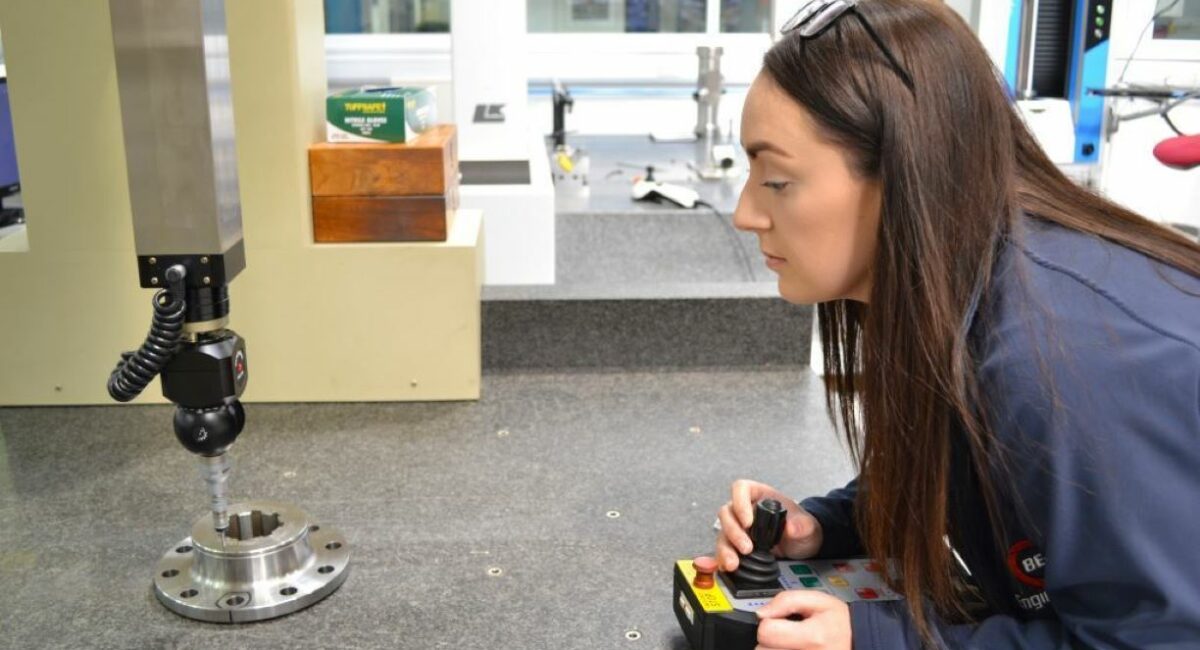We joined hundreds of others from across the industry, in celebrating International Women in Engineering Day 2019.
In 2019 the theme was ‘Transforming the Future’. It aims to encourage girls and women across the globe to consider a profession in engineering.
So, we spoke to BEL Engineering’s CMM Inspector, Sam. We found out more about her experiences as a woman in engineering, and how she thinks the future of the industry can be transformed.
Sam, tell us about how you got into engineering?
I left school when I was 16, and took up a machining apprenticeship with British Engines. I’d discovered British Engines through a series of mock interviews that they conducted at my school.
That night I went home and did some more research about British Engines and I realised that they were a good company to work for.
After I finished my four years as an apprentice, I worked on a CNC lathe for two years. Shortly after, an opportunity came up as a CMM Inspector at BEL Engineering, part of the British Engines Group. I thought it would be a great chance to broaden my horizons. I’ve now been in the role for two years, programming and running Coordinate Measuring Machines (CMM) to check components of various sizes and complexities that are being manufactured by the team. Each day I read and interpret technical drawings, complete inspection reports and also carry out mechanical inspections.
What has your experience working as part of the British Engines Group been like?
Great! Over the eight years that I’ve been working within the group, I’ve made a lot of friends and there’s a real variety of people that I’ve been lucky enough to learn from.
I worked for BEL Valves before I worked for BEL Engineering. So that in itself was a great opportunity. BEL Valves primarily works in the oil and gas industry. So there’s quite a big difference going into a sub-contract engineering environment like BEL Engineering; but it’s been really interesting and I’ve learnt a lot!
Do you think your experiences have been affected by being a woman working in engineering?
Honestly, I don’t feel like I’ve ever been treated any differently to any of the lads on the factory floor. I’ve always been treated in exactly the same way.
How are you helping to transform the future of engineering?
I help to train the apprentices who are currently on the British Engines Apprenticeship Scheme. I think when you’re starting a career in engineering as a young girl, it’s important to see that other females are working on the shop floor too, because it can be intimidating. It can be for any young person coming from school in to a workplace, but even more so for young girls when it’s such a male dominated environment. It’s definitely not something to be intimidated by and I always try my best to demonstrate that it isn’t.
Do you think that there is still a stigma around women in engineering?
Compared to a very long time ago, I think the industry has come a long way. Celebrations and events like International Women in Engineering Day help to recognise that it isn’t just a man’s industry.
In the future, what do you think it will be like for women working in the industry?
I think it’s going to get better and better! It’s already becoming a lot easier for women to get into the industry. Numbers are improving and there’s more encouragement than ever to get females to consider engineering as a profession.
How do you think that we can learn from the past in order to transform the future?
During the war women had to work in the factories while the men were away. I think that it’s important that this is taught more in schools to show that it hasn’t always been a man’s job and that women can do it too! We must also try and change the stigma attached to working in a factory.
Factories are no longer dirty, dark places to work. They are at the height of technology and provide an exciting, interesting and pleasant environment to work in.
As an industry, what do you think we can do to encourage women to consider engineering as a profession?
It should be spoken about more in schools. We should actively encourage females to take up work experience in the engineering industry. To encourage women to apply for roles in the industry, companies, training providers and colleges should go in to schools and give examples of career paths for women. Teachers could also be educated more, so that they know it is a career path for women just as much as men. How it is approached in schools effects how our young people develop their opinion about engineering and the working environment.
Are you considering a career in engineering? Click here to find out more information.
